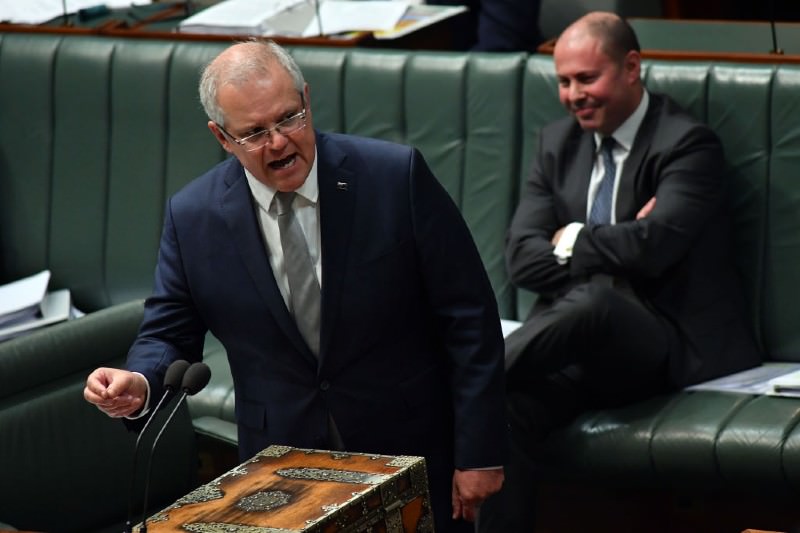Extract from Eureka Street
- Andrew Hamilton
- 02 July 2020
At the weekend the Prime Minister spoke about the JobSeeker allowance and the factors to be considered when reviewing its present doubled rate. He claimed anecdotal evidence that some employees were declining jobs because it was more attractive to accept JobSeeker, and that this needed to be weighed in any decision. This claim and the publicity given to it in the Murdoch press suggested that the air was being tested for a reduction of the rate after the Eden Monaro by-election, justified by the familiar representation of the unemployed as work-shy and socially degenerate.

It is worth reflecting more broadly on the responsibilities of Government entailed in the JobSeeker allowance, and to separate these from the rhetoric surrounding it.
The basic responsibility of government is to govern for the good of all citizens, and particularly the most vulnerable. This means promoting economic and legal settings that encourage people to work and guarantee the security and just recompense of their work. It also means enabling those who cannot work with the means to live and raise families decently. In both these tasks the actions of government must respect the human dignity of people who are often regarded as a burden on society.
Seen from this perspective the JobSeeker allowance is deceptively named. It conflates two distinct though related responsibilities of government: to promote participation in the workforce by matching jobs available to people seeking them, and to provide for those who cannot work, either because there is no work available or because their mental or physical health does not allow them to work. (The latter are catered for through disability payments.) The payments that discharge the responsibility to promote participation can correctly be called JobSeeker. The payments that discharge the responsibility to people who are unable to work through no fault of their own are better called social service payments.
The rhetoric that accompanies JobSeeker implies that the value of persons lies in the contribution through work that they make to society; that it is the responsibility of individual persons to support themselves; and that work is available for anyone who seeks it. On these presuppositions the government has no moral obligation to make payments to people who cannot find work. Such payments are a donation, made reluctantly, to which onerous and humiliating conditions can be attached.
Because the government does not accept responsibility for ensuring that all its citizens can live decently, it has no scruples in setting the benefit at a level that leaves people on the far edge of poverty. It is a system that does not respect the dignity of each human person, because it does not accept its claims. Morrison’s remarks about people on Jobseeker who are not willing to work reflect and reinforce this view of the world.
'The effects of COVID-19 and its illumination of the government's previous failure to guarantee the security of people in their work and its scorn for unemployed people makes this kind of rhetoric seem not only indecent but embarrassing.'
The effects of COVID-19 and its illumination of the government's previous failure to guarantee the security of people in their work and its scorn for unemployed people makes this kind of rhetoric seem not only indecent but embarrassing.
Already before the virus struck the government had refused to raise the JobSeeker allowance for many years, appealing to its need to eliminate a deficit. During that time work had become increasingly casualised, with little protection for workers, and the economy was increasingly stagnant, reflecting increasing unemployment, underemployment and anxiety about debt. This had led to decreased demand. Government policy with its single-minded focus on reducing the deficit was increasing the insecurity of work and threatening national prosperity.
The coming of COVID-19 has exposed the negligence of this policy. It has highlighted the vulnerability of people to the casualisation of work. The unemployment figures, masked by JobKeeper and by people who have given up on finding work, indicate how many people will continue to hope for work that is simply not available. Their loss of work will not reflect their unwillingness to work, but the effects of actions, proper and just though they were, taken by government in response to the virus. If government is responsible for the actions that aggravated unemployment, it also carries responsibility for ensuring that those left unemployed can live decently, and to address the failure of its previous policies to promote economic recovery.
The pauperisation of people who are unemployed is one of those policies that decreased demand and so economic growth. The doubling of JobSeeker has been a significant factor in promoting economic growth during the time of isolation. Given that people who are better off have focused on saving any income they receive, it is not only morally right but economically productive to maintain or raise Jobseeker from its COVID-19 level. The money would be spent on necessities, and so help to create the demand for goods that business needs to thrive. The rhetoric that says we are all in this together, too, would serve us all better than setting groups of Australians against one another.
 Andrew Hamilton is consulting editor of Eureka Street.
Andrew Hamilton is consulting editor of Eureka Street.
No comments:
Post a Comment